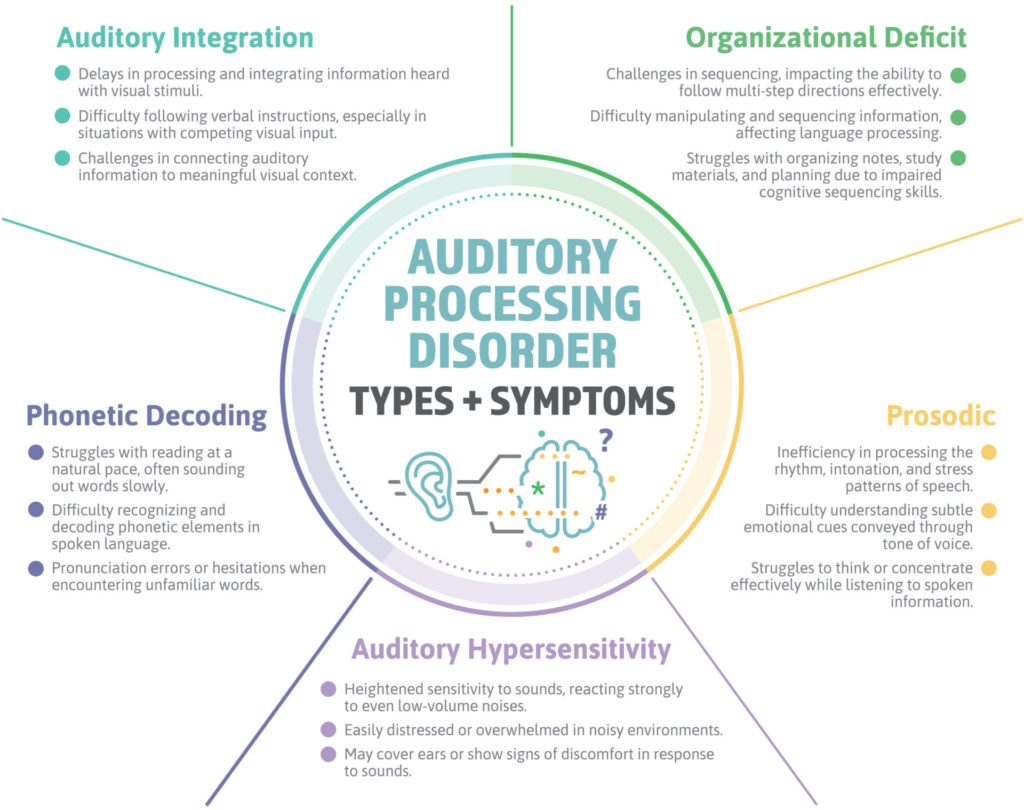Auditory Processing Disorder (APD) in adults is a little-understood, often misdiagnosed condition. Despite having normal peripheral hearing, individuals with APD struggle to process, interpret and understand sounds – especially speech – reliably.
This blog will explain what APD is, common signs to watch for, how it’s diagnosed in the UK, and how therapy can make a meaningful difference. If any of this resonates, we’ll guide you on how to book an appointment at our clinic.
What is Auditory Processing Disorder (APD)?
APD is not a hearing impairment, but rather a difficulty in the brain’s ability to make sense of sound. People with APD typically pass standard hearing tests, yet still face challenges with recognising speech, particularly in noisy environments, or when instructions are rapid or delivered with poor acoustic clarity.
The British Society of Audiology defines APD as difficulty with recognition, discrimination, grouping, localisation, or ordering of speech sounds, not attributable to general attention or language deficits.
Common signs of APD in adults
Adults with APD often adapt over the years, but certain signs may still reveal themselves, particularly under stress or in complex environments. Typical red flags include:
- Difficulty understanding speech in noisy settings (restaurants, meetings)
- Knowing someone is speaking but struggling to catch the words
- Frequently asking for repetition or clarification
- Misunderstanding similar-sounding words or interpreting words too literally
- Trouble following multi-step spoken instructions
- Difficulty concentrating on verbal information, with better comprehension via visual or written cues
- Poor auditory memory (e.g. recalling lists or sequences poorly)
- Social fatigue, anxiety or withdrawal, stemming from communication strain
These challenges may impact work performance, relationships, daily functioning or overall emotional wellbeing.

Diagnosis of APD in adults
Diagnosis is more nuanced than standard hearing tests. In the UK, diagnosing APD usually involves:
- Referring from GP: A GP can refer you to an audiologist or hearing specialist, particularly if hearing appears normal but listening remains difficult.
- Specialised audiological evaluation: These may include speech-in-noise tests, auditory discrimination, pitch-pattern recognition, temporal processing and electrophysiological measures (e.g. brain responses to sound).
- Questionnaires or checklists: These help assess listening difficulties such as poor localisation, inattention in busy environments or misinterpreting tone or nuance.
- Rule out other causes: It’s essential to eliminate other contributing factors like attention difficulties, language disorders or hearing issues before confirming APD.
If you suspect APD, seek a referral to a specialist audiology or APD clinic for a tailored assessment.
How therapy can make a meaningful difference
While there is no “cure” for APD, a range of therapeutic approaches can significantly improve daily functioning:
Auditory Training
This involves structured exercises to improve sound discrimination, auditory memory, and focus—often delivered by a qualified audiologist or speech-language therapist. Research highlights its positive impact on listening and communication in adults.
Environmental & Lifestyle Adjustments
Optimising listening environments is vital. Advice includes reducing background noise, speaking face-to-face, using visual supports, repeating or rephrasing speech as needed, and avoiding covering the mouth when speaking.
Compensatory Strategies
These may include requesting written materials in meetings, using noise-reducing earplugs in loud environments, taking notes during verbal instructions, or asking colleagues to speak more slowly or clearly.
Support and Understanding
Support from family, colleagues and employers significantly eases the burden of APD. Accepting colleagues and tailored adjustments at work can make a major difference.
Holistic Interventions
Since APD often overlaps with neurodivergence—like ADHD, autism or dyslexia—integrated support across communication, attention and learning domains can be beneficial.

APD diagnosis in the UK – What you need to know
In summary:
- Primary step: Visit your GP to discuss your symptoms and explore whether referral for APD assessment is appropriate.
- Assessment: A specialist audiologist conducts tailored testing beyond standard hearing tests.
- Outcome: With a confirmed diagnosis, a targeted therapy plan can be developed – ranging from auditory training to environmental strategies.
Why choose Hearing Therapy?
At Hearing Therapy, our audiology clinics in Sheffield and Mirfield offer:
- Specialist audiological and APD assessments
- Bespoke auditory training programmes
- Environmental advice and communication coaching
- Compassionate, client-centred care tailored to your personal and professional context
We understand how exhausting and isolating APD can feel – and we’re here to help you regain confidence in your hearing and communication abilities.
Book your appointment with Hearing Therapy
If any of the above resonates with you – difficulty following conversations in noisy places, constantly asking for repetition, struggling to remember spoken instructions – you’re not alone, and help is available.
Take the first step towards clarity and confidence. Book an appointment at our Sheffield or Mirfield clinic today to explore assessment for auditory processing disorder in adults.
